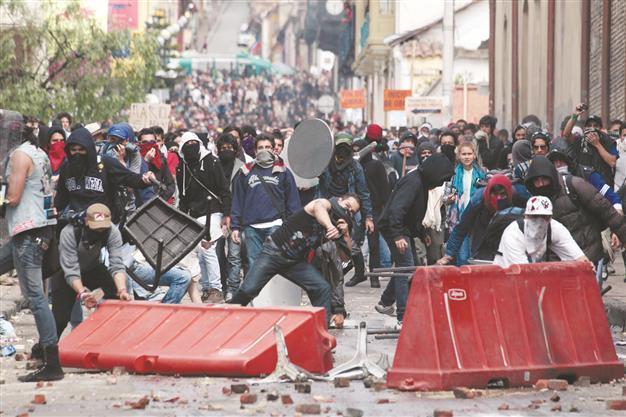Colombia farm protests reach Bogota
BOGOTA, Distrito Capital de Bogota - Agence France-Presse

Student demonstrators confront riot policemen during a protest against the government of President Juan Manuel Santos in Bogota. Thousands of farmers and state workers marched through Bogota to protect the impact of free trade deals. REUTERS Photo
Protesters clashed with police in downtown Bogota Thursday as demonstrations in support of Colombian farmworkers angered over the impact of free trade agreements spread to urban areas.
Thousands of students, professors and workers marched from different points of the city, converging on the central Plaza Bolivar where the protest turned violent.
Groups of hooded assailants smashed windows of banks and businesses in the historic center of the city, and attacked police with clubs and broken glass, an AFP photographer witnessed.
Police backed by riot control vehicles fired tear gas to disperse the protesters. There were no immediate reports of arrests or injured.
Interior Minister Fernando Carrillo denounced the assailants as "vandals and not farmworkers." Clashes between police and protesters also broke out in Medellin, Colombia's second largest city. An AFP photographer saw two journalists being beaten by police. Farmworkers demanding agricultural subsidies and fighting free market policies have been leading sometimes violent protests in rural areas for nearly two weeks.
They have been joined by miners and truck drivers, groups with their own grievances against government's economic policies.
President Juan Manuel Santos, who had played down the protests last week, acknowledged Thursday that the farmers were facing hard times.
"Without any doubt, we are going through a storm because of the neglect and absence of agricultural policies for a long time," he said in a televised speech. "And now we're paying the consequences." Santos promised to impose price controls on fertilizer and insecticides, and to curb contraband of foodstuffs.
Farmworkers have been hit by rising competition from imports resulting from a series of free trade agreements, and a 10 percent appreciation in the Colombian currency over the past year.
